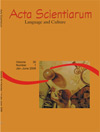<b>Mark Twain: innocent or sinner?</b> - DOI: 10.4025/actascilangcult.v31i1.6430
Abstract
After carefully reading the Treaty of Paris in 1900, Mark Twain concluded that the goal of U.S. policy was clearly one of subjugation. He openly declared himself an anti-imperialist at that time, in spite of the numerous criticisms he received from political opponents who supported the United States status quo. After traveling to Europe and the East in 1867 as a correspondent for The Daily Alta California newspaper, Mark Twain published his travel report, The Innocents Abroad or The New Pilgrim’s Progress in 1869. Our study demonstrates that the author, in spite of using different guises in his reports, narrated histories, cultures and traditions – from both Europe and the East – with a viewpoint already imbued by his anti-imperialistic ideals. Twain made use of parody, satire, irony and humor within his texts in order to desecrate empires, monarchs and the Church – all of which subjugated the weak – thus shedding light on cultural studies since then. Likewise, our study reflects on themes such as culture, tradition and the traveler’s eye, justifying the narrator’s “innocent point of view” in his report.Downloads
Metrics
DECLARATION OF ORIGINALITY AND COPYRIGHTS
I Declare that current article is original and has not been submitted for publication, in part or in whole, to any other national or international journal.
The copyrights belong exclusively to the authors. Published content is licensed under Creative Commons Attribution 4.0 (CC BY 4.0) guidelines, which allows sharing (copy and distribution of the material in any medium or format) and adaptation (remix, transform, and build upon the material) for any purpose, even commercially, under the terms of attribution.
Read this link for further information on how to use CC BY 4.0 properly.




















6.png)









